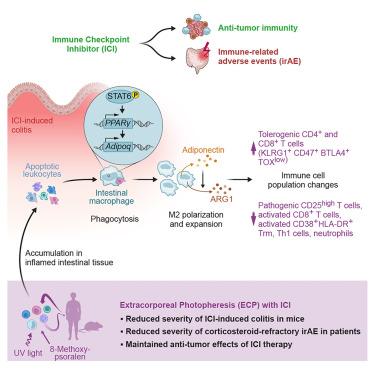Adiponectin reduces immune checkpoint inhibitor-induced inflammation without blocking anti-tumor immunity
IF 48.8
1区 医学
Q1 CELL BIOLOGY
引用次数: 0
Abstract
Immune-related adverse events (irAEs) in cancer patients receiving immune checkpoint inhibitors (ICIs) cause morbidity and necessitate cessation of treatment. Comparing irAE treatments, we find that anti-tumor immunity is preserved in mice after extracorporeal photopheresis (ECP) but reduced with glucocorticosteroids, TNFα blockade, and α4β7-integrin inhibition. Local adiponectin production elicits a tissue-specific effect by reducing pro-inflammatory T cell frequencies in the colon while sparing tumor-specific T cell development. A prospective phase-1b/2 trial (EudraCT-No.2021-002073-26) with 14 patients reveals low ECP-related toxicity. Overall response rate for all irAEs is 92% (95% confidence interval [CI]: 63.97%–99.81%); colitis-specific complete remission rate is 100% (95% CI: 63.06%–100%). Glucocorticosteroid dosages could be reduced for all patients after ECP therapy. The ECP-adiponectin axis reduces intestinal tissue-resident memory T cell activation and CD4+IFN-γ+ T cells in patients with ICI-induced colitis without evidence of loss of anti-tumor immunity. In conclusion, we identify adiponectin as an immunomodulatory molecule that controls ICI-induced irAEs without blocking anti-tumor immunity.

求助全文
约1分钟内获得全文
求助全文
来源期刊

Cancer Cell
医学-肿瘤学
CiteScore
55.20
自引率
1.20%
发文量
179
审稿时长
4-8 weeks
期刊介绍:
Cancer Cell is a journal that focuses on promoting major advances in cancer research and oncology. The primary criteria for considering manuscripts are as follows:
Major advances: Manuscripts should provide significant advancements in answering important questions related to naturally occurring cancers.
Translational research: The journal welcomes translational research, which involves the application of basic scientific findings to human health and clinical practice.
Clinical investigations: Cancer Cell is interested in publishing clinical investigations that contribute to establishing new paradigms in the treatment, diagnosis, or prevention of cancers.
Insights into cancer biology: The journal values clinical investigations that provide important insights into cancer biology beyond what has been revealed by preclinical studies.
Mechanism-based proof-of-principle studies: Cancer Cell encourages the publication of mechanism-based proof-of-principle clinical studies, which demonstrate the feasibility of a specific therapeutic approach or diagnostic test.
 求助内容:
求助内容: 应助结果提醒方式:
应助结果提醒方式:


